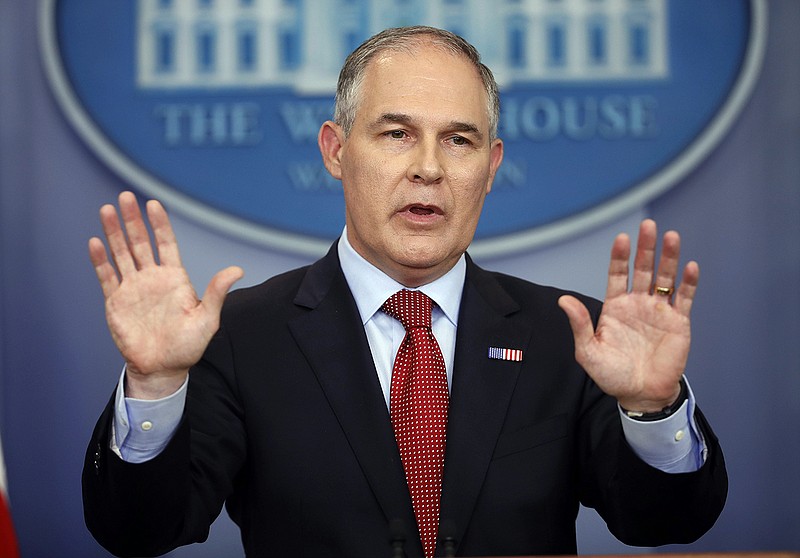NASHVILLE - The Trump administration's move to rescind a controversial Obama-era water pollution regulation is drawing praise from area federal lawmakers as a victory for common sense and local control but brickbats from environmental groups as a "gift" to polluters.
Last week, Environmental Protection Agency Administrator Scott Pruitt, acting on an executive order signed by President Donald Trump in February, released a 42-page proposal that ultimately will revoke the rule known as "Waters of the United States," or WOTUS.
The rule took effect in 2015 but was blocked by the 6th U.S. Circuit Court of Appeals in a challenge by Tennessee and other states. It sought to give EPA broad authority under the 1972 federal Clean Water Act to regulate pollution of wetlands and smaller waterways tied to traditional navigable waters or interstate waters.
Under the proposal from the EPA and the U.S. Army Corps of Engineers, federal officials would instead revert to guidance from an earlier document when deciding whether a waterway is subject to federal oversight of pollution control.
Agricultural, industrial and real estate development interests have railed against the Obama rule, especially provisions saying wetlands and tributaries must be "relatively permanent," a phrase used in prior rulings to mean they can be be intermittent or irregular.
That definition would extend federal jurisdiction to some 60 percent of the water bodies in the country.
U.S. Sen. Lamar Alexander, R-Tenn., has repeatedly criticized the WOTUS rule as an attempt to regulate farmers' "mud puddles."
"I've been fighting this regulation since it was announced because it gave the EPA and the Army Corps of Engineers the ability to regulate nearly all the water in the country," Alexander said. "I'm glad President Trump and his administration are taking the next step toward stopping it."
Georgia's Republican U.S. senators, Johnny Isakson and David Perdue, also welcomed the repeal. Isakson called it "great news for Georgia's farmers and our entire agriculture industry" and added, "Federal government bureaucrats should not have the ability to control our streams, creeks, wetlands, ponds and ditches."
Perdue called it "a huge victory" from "a President who is taking our concerns seriously." He added, "This Obama-era rule was a blatant overreach from the federal government."
U.S. Rep. Scott DesJarlais, R-Tenn., who represents one of Tennessee's most rural congressional districts, said the rule threatened private property rights, state law and the state's agriculture industry.
"It was a federal land grab, pure and simple, threatening citizens' property rights and state authority, as well as the Constitution's separation of powers," DesJarlais said in a news release.
But environmental groups including the Southern Environmental Law Center say gutting the rule will have an especially bad impact in the South.
"EPA's proposal to rescind the Clean Water Rule calls into question basic protections for many streams and wetlands and jeopardizes clean water for all Americans, and nowhere is that threat greater to the health and wellbeing of our communities than in the South," Derb Carter, director of the SELC's North Carolina offices, said in a statement.
Carter said that compared to other regions, Southern states, inluding Tennessee, "have more miles of streams, more acres of wetlands, and weak and underfunded state water quality programs, making the region especially vulnerable to the loss of federal clean water protections."
He said weakening the rule "is a gift to polluters."
According to the SELC, the existing rule protects waterways that nearly 20 million people in Tennessee, Georgia, Alabama, North Carolina, South Carolina and Virginia depend on for drinking water.
The six states collectively have more than 600,000 miles of streams and some 22 million acres of wetlands, which the SELC said helps filter polluted runoff as well as reduce risks of flooding and boost wildlife habitat protections.
In Tennessee, according to the SELC, threatened waters include small trout streams in the mountains, upland swamps on the Cumberland Plateau and highland bogs. The group said 57 percent of the stream miles ultimately flow into public drinking water systems for 3.5 million people.
According to SELC, Georgia's threatened waters include small creeks in the northern mountains, cypress domes in the Coastal Plain and over half the stream miles in the Piedmont that supply water to public drinking water systems for 4.9 million people.
Contact Andy Sher at asher@times freepress.com or 615-255-0550. Follow him on Twitter @AndySher1.
